- Home
- Oliver Sacks
The man who mistook his wife for a hat Page 4
The man who mistook his wife for a hat Read online
Page 4
A sudden, improbable suspicion seized me.
'What year is this, Mr G.?' I asked, concealing my perplexity under a casual manner.
'Forty-five, man. What do you mean?' He went on, 'We've won the war, FDR's dead, Truman's at the helm. There are great times ahead.'
'And you, Jimmie, how old would you be?'
Oddly, uncertainly, he hesitated a moment, as if engaged in calculation.
'Why, I guess I'm nineteen, Doc. I'll be twenty next birthday.'
Looking at the grey-haired man before me, I had an impulse for which I have never forgiven myself-it was, or would have been, the height of cruelty had there been any possibility of Jim-mie's remembering it.
'Here,' I said, and thrust a mirror toward him. 'Look in the mirror and tell me what you see. Is thata nineteen-year-old looking out from the mirror?'
He suddenly turned ashen and gripped the sides of the chair. 'Jesus Christ,' he whispered. 'Christ, what's going on? What's happened to me? Is this a nightmare? Am I crazy? Is this a joke?'- and he became frantic, panicked.
'It's okay, Jimmie,' I said soothingly. 'It's just a mistake. Nothing to worry about. Hey!' I took him to the window. 'Isn't this a lovely spring day. See the kids there playing baseball?' He regained his colour and started to smile, and I stole away, taking the hateful mirror with me.
Two minutes later I re-entered the room. Jimmie was still standing by the window, gazing with pleasure at the kids playing baseball below. He wheeled around as I opened the door, and his face assumed a cheery expression.
'Hiya, Doc!' he said. 'Nice morning! You want to talk to me- do I take this chair here?' There was no sign of recognition on his frank, open face.
'Haven't we met before, Mr G.?' I asked casually.
'No, I can't say we have. Quite a beard you got there. I wouldn't forget you, Doc!'
'Why do you call me "Doc"?'
'Well, you are a doc, ain't you?'
'Yes, but if you haven't met me, how do you know what I am?'
'You talk like a doc. I can see you're a doc'
'Well, you're right, I am. I'm the neurologist here.'
'Neurologist? Hey, there's something wrong with my nerves? And "here"-where's "here"? What is this place anyhow?'
'I was just going to ask you-where do you think you are?'
'I see these beds, and these patients everywhere. Looks like a sort of hospital to me. But hell, what would I be doing in a hospital-and with all these old people, years older than me. I feel good, I'm strong as a bull. Maybe I work here … Do I work? What's my job? . . . No, you're shaking your head, I see in your eyes I don't work here. If I don't work here, I've been put here. Am I a patient, am I sick and don't know it, Doc? It's crazy, it's scary … Is it some sort of joke?'
'You don't know what the matter is? You really don't know? You remember telling me about your childhood, growing up in Connecticut, working as a radio operator on submarines? And how your brother is engaged to a girl from Oregon?'
'Hey, you're right. But I didn't tell you that, I never met you before in my life. You must have read all about me in my chart.
'Okay,' I said. 'I'll tell you a story. A man went to his doctor complaining of memory lapses. The doctor asked him some routine questions, and then said, "These lapses. What about them?" "What lapses?" the patient replied.'
'So that's my problem,' Jimmie laughed. 'I kinda thought it was. I do find myself forgetting things, once in a while-things that have just happened. The past is clear, though.'
'Will you allow me to examine you, to run over some tests?'
'Sure,' he said genially. 'Whatever you want.'
On intelligence testing he showed excellent ability. He was quick-witted, observant, and logical, and had no difficulty solving complex problems and puzzles-no difficulty, that is, if they could be done quickly. If much time was required, he forgot what he was doing. He was quick and good at tic-tac-toe and checkers, and cunning and aggressive-he easily beat me. But he got lost at chess-the moves were too slow.
Homing in on his memory, I found an extreme and extraordinary loss of recent memory-so that whatever was said or shown to him was apt to be forgotten in a few seconds' time. Thus I laid out my watch, my tie, and my glasses on the desk, covered them, and asked him to remember these. Then, after a minute's chat, I asked him what I had put under the cover. He remembered none of them-or indeed that I had even asked him to remember. I repeated the test, this time getting him to write down the names of the three objects; again he forgot, and when I showed him the paper with his writing on it he was astounded, and said he had no recollection of writing anything down, though he acknowledged that it was his own writing, and then got a faint 'echo' of the fact that he had written them down.
He sometimes retained faint memories, some dim echo or sense of familiarity. Thus five minutes after I had played tic-tac-toe with him, he recollected that 'some doctor' had played this with him 'a while back'-whether the 'while back' was minutes or months ago he had no idea. He then paused and said, 'It could have been you?' When I said it was me, he seemed amused. This faint amusement and indifference were very characteristic, as were the involved cogitations to which he was driven by being so disoriented and lost in time. When I asked Jimmie the time of the year, he would immediately look around for some clue-I was careful to remove the calendar from my desk-and would work out the time of year, roughly, by looking through the window.
It was not, apparently, that he failed to register in memory, but that the memory traces were fugitive in the extreme, and were apt to be effaced within a minute, often less, especially if there were distracting or competing stimuli, while his intellectual and perceptual powers were preserved, and highly superior.
Jimmie's scientific knowledge was that of a bright high school graduate with a penchant for mathematics and science. He was superb at arithmetical (and also algebraic) calculations, but only if they could be done with lightning speed. If there were many steps, too much time, involved, he would forget where he was, and even the question. He knew the elements, compared them,
and drew the periodic table-but omitted the transuranic elements.
'Is that complete?' I asked when he'd finished.
'It's complete and up-to-date, sir, as far as I know.'
'You wouldn't know any elements beyond uranium?'
'You kidding? There's ninety-two elements, and uranium's the last.'
I paused and flipped through a National Geographic on the table. 'Tell me the planets,' I said, 'and something about them.' Unhesitatingly, confidently, he gave me the planets-their names, their discovery, their distance from the sun, their estimated mass, character, and gravity.
'What is this?' I asked, showing him a photo in the magazine I was holding.
'It's the moon,' he replied.
'No, it's not,' I answered. 'It's a picture of the earth taken from the moon.'
'Doc, you're kidding! Someone would've had to get a camera up there!'
'Naturally.'
'Hell! You're joking-how the hell would you do that?'
Unless he was a consummate actor, a fraud simulating an astonishment he did not feel, this was an utterly convincing demonstration that he was still in the past. His words, his feelings, his innocent wonder, his struggle to make sense of what he saw, were precisely those of an intelligent young man in the forties faced with the future, with what had not yet happened, and what was scarcely imaginable. 'This more than anything else,' I wrote in my notes, 'persuades me that his cut-off around 1945 is genuine . . . What I showed him, and told him, produced the authentic amazement which it would have done in an intelligent young man of the pre-Sputnik era.'
I found another photo in the magazine and pushed it over to him.
'That's an aircraft carrier,' he said. 'Real ultramodern design. I never saw one quite like that.'
'What's it called?' I asked.
H
e glanced down, looked baffled, and said, 'The Nimitzl'
'Something the matter?'
'The hell there is!' he replied hotly. 'I know 'em all by name, and I don't know a Nimitz … Of course there's an Admiral Nimitz, but I never heard they named a carrier after him.'
Angrily he threw the magazine down.
He was becoming fatigued, and somewhat irritable and anxious, under the continuing pressure of anomaly and contradiction, and their fearful implications, to which he could not be entirely oblivious. I had already, unthinkingly, pushed him into panic, and felt it was time to end our session. We wandered over to the window again, and looked down at the sunlit baseball diamond; as he looked his face relaxed, he forgot the Nimitz, the satellite photo, the other horrors and hints, and became absorbed in the game below. Then, as a savoury smell drifted up from the dining room, he smacked his lips, said 'Lunch!', smiled, and took his leave.
And I myself was wrung with emotion-it was heartbreaking, it was absurd, it was deeply perplexing, to think of his life lost in limbo, dissolving.
'He is, as it were,' I wrote in my notes, 'isolated in a single moment of being, with a moat or lacuna of forgetting all round him … He is man without a past (or future), stuck in a constantly changing, meaningless moment.' And then, more prosaically, 'The remainder of the neurological examination is entirely normal. Impression: probably Korsakov's syndrome, due to alcoholic degeneration of the mammillary bodies.' My note was a strange mixture of facts and observations, carefully noted and itemised, with irrepressible meditations on what such problems might 'mean', in regard to who and what and where this poor man was-whether, indeed, one could speak of an 'existence', given so absolute a privation of memory or continuity.
I kept wondering, in this and later notes-unscientifically- about 'a lost soul', and how one might establish some continuity, some roots, for he was a man without roots, or rooted only in the remote past.
'Only connect'-but how could he connect, and how could we help him to connect? What was life without connection? 'I may
venture to affirm,' Hume wrote, 'that we are nothing but a bundle or collection of different sensations, which succeed each other with an inconceivable rapidity, and are in a perpetual flux and movement.' In some sense, he had been reduced to a 'Humean' being- I could not help thinking how fascinated Hume would have been at seeing in Jimmie his own philosophical 'chimaera' incarnate, a gruesome reduction of a man to mere disconnected, incoherent flux and change.
Perhaps I could find advice or help in the medical literature- a literature which, for some reason, was largely Russian, from Korsakov's original thesis (Moscow, 1887) about such cases of memory loss, which are still called 'Korsakov's syndrome', to Lu-ria's Neuropsychology of Memory (which appeared in translation only a year after I first saw Jimmie). Korsakov wrote in 1887:
Memory of recent events is disturbed almost exclusively; recent impressions apparently disappear soonest, whereas impressions of long ago are recalled properly, so that the patient's ingenuity, his sharpness of wit, and his resourcefulness remain largely unaffected.
To Korsakov's brilliant but spare observations, almost a century of further research has been added-the richest and deepest, by far, being Luria's. And in Luria's account science became poetry, and the pathos of radical lostness was evoked. 'Gross disturbances of the organization of impressions of events and their sequence in time can always be observed in such patients,' he wrote. 'In consequence, they lose their integral experience of time and begin to live in a world of isolated impressions.' Further, as Luria noted, the eradication of impressions (and their disorder) might spread backward in time-'in the most serious cases-even to relatively distant events.'
Most of Luria's patients, as described in this book, had massive and serious cerebral tumours, which had the same effects as Korsakov's syndrome, but later spread and were often fatal. Luria included no cases of 'simple' Korsakov's syndrome, based on the self-limiting destruction that Korsakov described-neuron destruction, produced by alcohol, in the tiny but crucial mammillary
bodies, the rest of the brain being perfectly preserved. And so there was no long-term follow-up of Luria's cases.
I had at first been deeply puzzled, and dubious, even suspicious, about the apparently sharp cut-off in 1945, a point, a date, which was also symbolically so sharp. I wrote in a subsequent note:
There is a great blank. We do not know what happened then- or subsequently . . . We must fill in these 'missing' years- from his brother, or the navy, or hospitals he has been to . . . Could it be that he sustained some massive trauma at this time, some massive cerebral or emotional trauma in combat, in the war, and that this may have affected him ever since? . . . was the war his 'high point', the last time he was really alive, and existence since one long anti-climax?*
We did various tests on him (EEG, brain scans), and found no evidence of massive brain damage, although atrophy of the tiny mammillary bodies would not show up on such tests. We received reports from the navy indicating that he had remained in the navy until 1965, and that he was perfectly competent at that time.
Then we turned up a short nasty report from Bellevue Hospital, dated 1971, saying that he was 'totally disoriented . . . with an advanced organic brain-syndrome, due to alcohol' (cirrhosis had also developed by this time). From Bellevue he was sent to a wretched dump in the Village, a so-called 'nursing home' whence he was rescued-lousy, starving-by our Home in 1975.
We located his brother, whom Jimmie always spoke of as being in accountancy school and engaged to a girl from Oregon. In fact
*In his fascinating oral history The Good War (1985) Studs Terkel transcribes countless stories of men and women, especially fighting men, who felt World War II was intensely real-by far the most real and significant time of their lives-everything since as pallid in comparison. Such men tend to dwell on the war and to relive its battles, comradeship, moral certainties and intensity. But this dwelling on the past and relative hebetude towards the present-this emotional dulling of current feeling and memory-is nothing like Jimmie's organic amnesia. 1 recently had occasion to discuss the question with Terkel: 'I've met thousands of men,' he told me, 'who feel they've just been "marking time" since '45-but I never met anyone for whom time terminated, like your amnesiac Jimmie.'
he had married the girl from Oregon, had become a father and grandfather, and been a practising accountant for thirty years.
Where we had hoped for an abundance of information and feeling from his brother, we received a courteous but somewhat meagre letter. It was obvious from reading this-especially reading between the lines-that the brothers had scarcely seen each other since 1943, and gone separate ways, partly through the vicissitudes of location and profession, and partly through deep (though not estranging) differences of temperament. Jimmie, it seemed, had never 'settled down', was 'happy-go-lucky', and 'always a drinker'. The navy, his brother felt, provided a structure, a life, and the real problems started when he left it, in 1965. Without his habitual structure and anchor Jimmie had ceased to work, 'gone to pieces,' and started to drink heavily. There had been some memory impairment, of the Korsakov type, in the middle and especially the late Sixties, but not so severe that Jimmie couldn't 'cope' in his nonchalant fashion. But his drinking grew heavier in 1970.
Around Christmas of that year, his brother understood, he had suddenly 'blown his top' and become deliriously excited and confused, and it was at this point he had been taken into Bellevue. During the next month, the excitement and delirium died down, but he was left with deep and bizarre memory lapses, or 'deficits,' to use the medical jargon. His brother had visited him at this time-they had not met for twenty years-and, to his horror, Jimmie not only failed to recognise him, but said, 'Stop joking! You're old enough to be my father. My brother's a young man, just going through accountancy school.'
When I received this information, I was more perplexed still: why did Jimmie not remember his later years
in the navy, why did he not recall and organise his memories until 1970? I had not heard then that such patients might have a retrograde amnesia (see Postscript). 'I wonder, increasingly,' I wrote at this time, 'whether there is not an element of hysterical or fugal amnesia-whether he is not in flight from something too awful to recall', and I suggested he be seen by our psychiatrist. Her report was searching and detailed-the examination had included a sodium amytal test, calculated to 'release' any memories which might be repressed.
She also attempted to hypnotize Jimmie, in the hope of eliciting memories repressed by hysteria-this tends to work well in cases of hysterical amnesia. But it failed because Jimmie could not be hypnotized, not because of any 'resistance,' but because of his extreme amnesia, which caused him to lose track of what the hypnotist was saying. (Dr M. Homonoff, who worked on the amnesia ward at the Boston Veterans Administration hospital, tells me of similar experiences-and of his feeling that this is absolutely characteristic of patients with Korsakov's, as opposed to patients with hysterical amnesia.)
'I have no feeling or evidence,' the psychiatrist wrote, 'of any hysterical or "put-on" deficit. He lacks both the means and the motive to make a facade. His memory deficits are organic and permanent and incorrigible, though it is puzzling they should go back so long.' Since, she felt, he was 'unconcerned . . . manifested no special anxiety . . . constituted no management problem,' there was nothing she could offer, or any therapeutic 'entrance' or 'lever' she could see.
At this point, persuaded that this was, indeed, 'pure' Korsakov's, uncomplicated by other factors, emotional or organic, I wrote to Luria and asked his opinion. He spoke in his reply of his patient Bel,* whose amnesia had retroactively eradicated ten years. He said he saw no reason why such a retrograde amnesia should not thrust backward decades, or almost a whole lifetime. 'I can only wait for the final amnesia,' Buriuel writes, 'the one that can erase an entire life.' But Jimmies amnesia, for whatever reason, had erased memory and time back to 1945-roughly-and then stopped. Occasionally, he would recall something much later, but the recall was fragmentary and dislocated in time. Once, seeing the word 'satellite' in a newspaper headline, he said offhandedly that he'd been involved in a project of satellite tracking while on the ship Chesapeake Bay, a memory fragment coming from the early or mid-Sixties. But, for all practical purposes, his cut-off point was during the mid- (or late) Forties, and anything subsequently re-

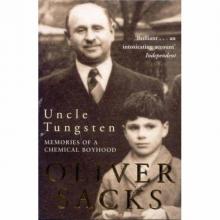 Uncle Tungsten
Uncle Tungsten Oaxaca Journal
Oaxaca Journal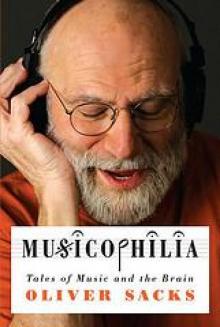 Musicophilia
Musicophilia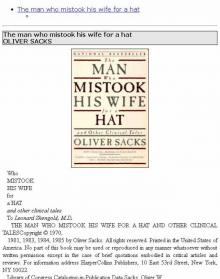 The man who mistook his wife for a hat
The man who mistook his wife for a hat 1989 - Seeing Voices
1989 - Seeing Voices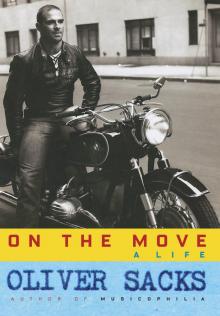 On the Move: A Life
On the Move: A Life 1996 - The Island of the Colorblind
1996 - The Island of the Colorblind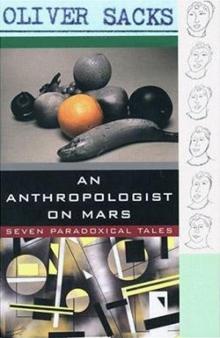 An Anthropologist on Mars: Seven Paradoxical Tales
An Anthropologist on Mars: Seven Paradoxical Tales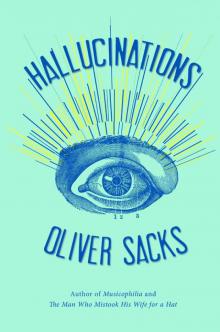 Hallucinations
Hallucinations Seeing Voices
Seeing Voices The River of Consciousness
The River of Consciousness Vintage Sacks
Vintage Sacks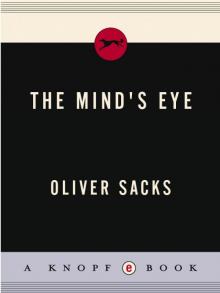 The Mind's Eye
The Mind's Eye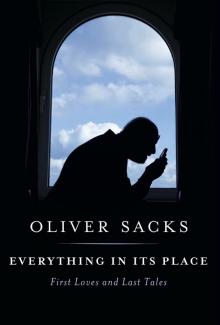 Everything in Its Place
Everything in Its Place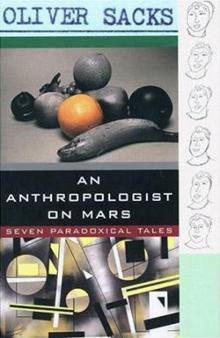 An Anthropologist on Mars (1995)
An Anthropologist on Mars (1995)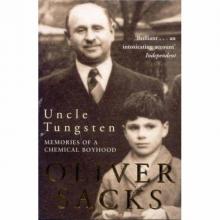 Uncle Tungsten: Memories of a Chemical Boyhood (2001)
Uncle Tungsten: Memories of a Chemical Boyhood (2001)